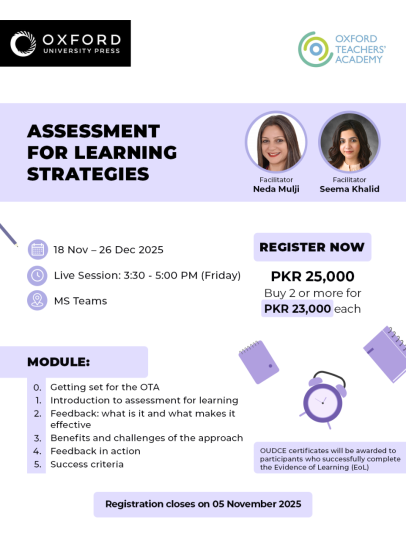Assessment for Learning Strategies
- Buy 2 or more for PKR 23,000 each
This course offers a practical and reflective journey into Assessment for Learning (AFL), focusing on how to effectively identify and respond to your students’ learning needs. You’ll explore strategies for gathering meaningful evidence about student progress and examine how to use that information to support learning in real time.
A central theme of the course is the role of feedback—what makes it effective, and how to apply it in ways that genuinely enhance student understanding. Through relatable classroom examples, the course emphasizes a learner-centered approach that supports both students and teachers.
Whether you're new to AFL or looking to deepen your practice, this course provides fresh insights, practical tools, and opportunities to reflect on your own teaching context. It is designed to support educators across a wide range of settings.
Start Date: 18 November 2025
End Date: 26 December 2025
Registration deadline: 05 November 2025
Live Classes: Friday – 03:30-05:00 PM
Duration: 6 weeks
Time commitment: 3 hours per week on course reading and assignments
Course Price: 25000
| Module 0: Getting set for the OTA | Module 1: Introduction to assessment for learning |
|
|
| Module 2: Feedback: what is it and what makes it effective | Module 3: Benefits and challenges of the approach |
|
|
| Module 4: Feedback in action | Module 5: Success criteria |
|
|

Neda Mulji is working with OUP as Senior Manager, Professional Development and is a Fellow of the Higher Education Academy UK. Before joining OUP, Neda has taught communication skills and English courses for several years as a university lecturer in Dubai and English as a Foreign Language in London, UK. She has a BSc (Hons.) from LUMS, MA in Postcolonial Studies – Literature and Culture from Goldsmiths, University of London, a Cambridge Certificate of English Language Teaching to Adults (CELTA) and a Postgraduate Certificate in Higher Education (PGC-HE) from Middlesex University. Neda is a columnist for Dawn on topics in education and has authored a book on parenting, titled ‘The Love Connection’, published by Austin Macauley, UK. She has also written a children’s story called ‘Little Jimmy’, published by OUP. Neda is a certified workplace coach with the European Mentoring and Coaching Council (EMCC).

Seema Khurram is a certified educationist from the Australian Catholic University, with expertise in Educational Leadership & Management, Staff Development, and School Management. She brings diverse experience in both teaching and leadership roles at schools and higher secondary institutions (college level). Seema specializes in developing effective classroom tools to teach conceptual and problem-solving skills through an activity-based approach. She has four years of leadership experience at Aga Khan School, where she served as Academic Coordinator and Vice Principal. Currently, she is working as a Regional Professional Development Coordinator at Oxford University Press.
Course requirements
Participants must demonstrate a minimum intermediate level of English language proficiency (B2) to be able to process and engage fully with course content.
Participants should have access to a class/students to apply course practice.
Participants should have access to an internet service, a laptop/PC, and headphones.
Participants will be expected to commit a minimum of 18 hours online over the duration of their course –roughly 3hrs per module.
FAQs
How long is the course?
The course will run for six weeks
How many online sessions will there be?
This course has both asynchronous and synchronous content. You will be required to read some course material and complete some tasks at your own convenience. Live sessions with the tutor will be held on Microsoft Teams once a week for 90 minutes.
How much will it cost?
The course fee is PKR 25,000. We offer a discount for multiple registrations – PKR 23,000 each if two or more participants register together.
What will I get?
Participants will be given course material online, handouts to read and support from the tutor. Upon successful completion of the course, you will receive an E-certificate from the Oxford University Department of Continuing Education (OUDCE).
What do I need to do to complete the course?
You will be required to read the course material, complete the tasks given on the course platform, contribute to the discussion board, respond to your colleague’s input, attend at least 80% of the live sessions and complete the Evidence of Learning.
What is Evidence of Learning?
This is a reflection and action plan of 450-650 words to show your learning from the course. You will have 3 months after the end of the course to email your Evidence of Learning to be assessed by OUDCE.
OUDCE certificates will be awarded to participants who successfully complete the Evidence of Learning (EoL)




 Bulk Order
Bulk Order Request a Quote
Request a Quote